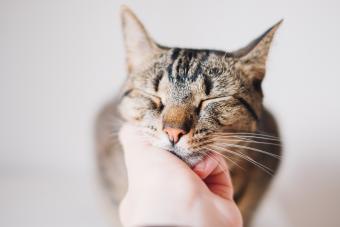
Cats are the masters of mixed signals. If you have a cat, you might be familiar with their "love bites." So, why does your cat bite you? And why is it often a gentle bite seemingly out of nowhere? Your cat is trying to tell you something. They might be overstimulated, in pain, scared, playing, or simply looking for attention. Understanding what they're trying to communicate can help you stop these love bites and keep your hands nibble-free.
Why Does My Cat Bite Me?
Whether your cat bites you out of the blue or while you're petting them, there's a message behind these nips. They're trying to tell you something. There are six things most cats want to communicate through a bite:
- They're overstimulated. Too much is going on, and your cat is looking for you to do something about it.
- They're in pain. Your cat is grouchy, and they are letting you know they aren't feeling well.
- They're scared. Something has frightened your cat, and they are trying to protect themselves.
- They're playing. Cats can be mischievous, and kittens naturally bite each other when playing.
- They're seeking attention. Your cat wants you to give them some love, and they'll bite you to get it.
- They're redirecting aggression. They might be mad at another cat playmate, or just in a bad mood.
Context is everything here. Pay attention to what's going on before the bite occurs, along with your cat's body language and posture. If you're cutting their nails and they nip at you, it could be that they're scared, whereas if you're petting them and they give you a love bite, it's probably overstimulation. If your cat is in pain, you need to take them to your veterinarian.
Petting-induced Biting in Cats
It's a common scene: you're petting your cat, they seem to be enjoying it, but then they suddenly bite you out of nowhere. Your cat is probably overstimulated, and they're trying to let you know they've had enough petting. Experts refer to this as petting-induced aggression. Dealing with it can be tricky.
- Stop petting-induced biting before it starts. The best way to combat overstimulation from petting is to stop petting your cat at the first warning sign they've had enough. These signs can be subtle, like a gentle tail swish or twitch of the skin on their back, or they can be more obvious, like your cat taking your hand between their paws.
- Interrupt the behavior. As soon as you see these signals, pause your petting session to interrupt the petting-then-biting cycle and avoid your cat becoming too overstimulated. You can resume petting them once they've calmed down.
- Change their focus. If your cat bites you while you're petting them, try to refocus their attention to a toy. However, whatever you do, don't treat them or reward them with play. This would just reinforce the unwanted behavior.
- Avoid their sensitive spots. Be sure to pay attention to where you're petting your cat. Most cats dislike being touched on their bellies, paws, and tails. Focus on petting their face, head, neck, and shoulders instead.
Some cats are very sensitive in certain areas, and you might be triggering them when you touch their no-go spots. They may have a condition called hyperesthesia, or "twitchy cat syndrome," where a cat may display heightened sensitivity when they are touched on their back and spine.
Biting and Purring
When you pet your cat, they probably purr loudly. Most of the time, this probably indicates that your cat is content. However, purring isn't always a sign of happiness in cats. They may also purr when they're nervous or scared. Experts suggest it could be something they do to soothe themselves in stressful situations.
So, if your cat bites you while they're purring, it could be they are feeling overwhelmed and engaging in defensive biting. Other indications that your cat is anxious are ears back, puffed-up tail, arched back, wide eyes, and vocalizing.
On the other hand, cats do purr while playing, so it's possible these could be playful love bites. This is more common with kittens versus adult cats. But, in general, biting even while playing is a sign to slow down and take a break.
When Cat Biting Goes Too Far
Of course, cat biting can go too far. You could be at high risk for a nasty infection if the teeth break skin. Statistics show that one in three people with cat hand bites need to be hospitalized, so cat bites are indeed serious.
If your cat bites you every time you touch them, there could be a medical or behavioral reason behind it. Arthritis pain, hyperesthesia, or skin or muscle conditions can cause a cat to bite anytime their touched. Take your cat in to your veterinarian for a check-up to rule any of these out.
How to Prevent Cat Biting
No matter why your cat is biting, you don't want to let them continue. You may be tempted to punish your cat if they bite you. However, this is not a good approach.
The best way to prevent cat biting is to address the behavior early, when they are kittens. Use these methods early in your cat's life to help teach them appropriate behavior. However, these techniques can help any cat learn not to bite, as long as you remain consistent and calm.
- Do not punish your cat. This can harm your bond, and could further agitate them. Do not spray them with water or get physical. Punishment is also unlikely to reduce the behavior. Instead, you run the risk of escalating things.
- Figure out your cat's trigger. Watching for clues and context is very important here. If your cat is agitated, stressed, or in pain, figure out what's causing their discomfort and remove the stimulus.
- Establish rules to prevent biting. Do not let your cat play with your hands, toes, or clothes. If your cat bites out of fear or from anxiety, do not engage with them when they appear to be upset. Also, make sure all members of your family and visitors do the same. Your cat needs to learn that biting will not lead to them receiving attention.
- Redirect the biting behavior. This is an important step in resolving your cat's biting. Do no reward them with attention, either positive or negative. Instead, get them to focus elsewhere, such as on an interactive toy or chew toy.
- Retrain your cat. Reward your cat when they are playing gently. If your cat kneads you when they're relaxing, praise and even treat them for not displaying their claws. If they put their claws out or display their teeth, pull your hand away and yelp or say "Ow" to indicate you don't like the behavior.
If your cat bites you and they aren't letting go, you need to get your cat to release their bite. Do not pull away quickly - this may trigger their prey response. Instead, gently push your hand closer to their mouth. This is uncomfortable for them - and you - but it should get them to let go. Seek a vet's or pet behaviorist's help. Treat all cat bites as a potential infection risk.
Cat Use Love Bites as Communication
Cats rarely bite for the fun of it. There's always a reason behind their love bites. Even if it feels as though the nip is unprovoked, it's possible you just didn't notice the subtle signs beforehand. Have your cat checked out to make sure there's no physical reason behind their biting, then use positive reinforcement to train your cat to stop biting you.







